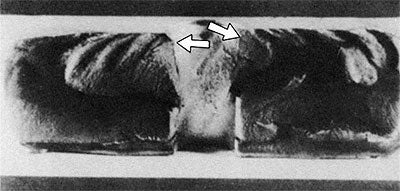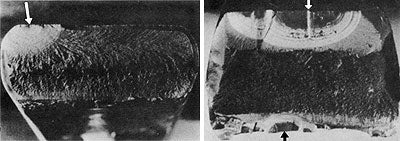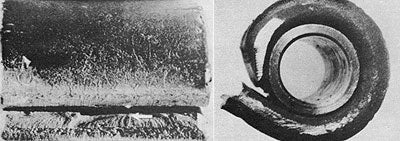Ever have a leaf spring crack, become fatigued or break and wonder what the cause is? We will take a look at a few common reasons why leaf springs fail.
Loose U-Bolts
The image below shows center bolt failure due to a truck spring not having tight enough u-bolts. U-bolts, especially on newly installed truck springs should be checked periodically to verify they are tight. Even if you have a professional installer install springs on your truck, you should stop by after 500 miles and have your u-bolts inspected to make sure they didn't come loose.

Corrosion and Fatigue
Corrosion and fatigue are typically caused by a combination of time and the elements. Numerous variables will weigh on how long your leaf spring will last before it suffers from corrosion or fatigue. How much weight you haul, what part of the country you live in, etc. will play a role in the life of your springs. Making sure salt and other corrosive materials are washed off and not overloading your truck will help prevent corrosion and early spring fatigue.

Overloading Your Truck Springs
Everyone says they never do it , but we see it all the time. Overloading is pretty self-explanatory. You have more weight in the back of your truck or you are towing a load heavier than what your truck is rated at. We all love to do it, but the negative effect on your truck springs is unavoidable. On the left image below you can see the radial shear marks from an overloaded spring. The image on the right shows distortion of the spring eye from overloading.

How do you prevent overloading your truck springs? Obviously you could carry less weight or purchase a truck with a higher weight rating. If buying a new truck or hauling less weight is not an option, you could add an overload kit like a Firestone Air Spring kit, Hellwig Helper springs or a Air Lift Air Spring kit. Overload kits are designed to take some of the weight off the leaf springs and place it onto the overload kit.
Another option that is more popular with commercial vehicles it to add another piece of steel to the spring pack. This may cause the ride to be stiffer, but if you are always hauling heavier loads in a commercial setting this may be your best bet.
We do not recommend adding a new piece of steel to leaf springs that already suffer from fatigue. You are better off replacing both of your truck springs with new ones with a higher weight rating. It's very common that we will have someone only want to replace one busted leaf in a spring pack and a few months later a different leaf breaks. If one has cracked, the others are probably in the same condition and will not last much longer.
Weld Splatter
Weld splatter is more common in commercial trucks and vans that come from the factory without a bed or on motorhome leaf springs . This is caused by welding a body or accessories to your truck in the same area as your leaf springs. Just a small amount of weld spatter can be disastrous to the life of your spring. About the only way to prevent this is to inspect your springs after and make sure no one was careless with the welder.

Above are a few common reasons why leaf springs fail. There are other manufacturing reasons such as quench cracks, tight eyes, notches, incorrect temperatures, etc. that can cause failure. With today's modern, high-tech manufacturing processes and quality control, they are not nearly as commons as they were in the past.
If you need have any questions about your leaf springs or need replacment leaf springs, call Michigan Truck Spring at 1-800-358-4751. They carry OEM replacment leaf springs for everything from old corvettes to semi trucks and trailers.